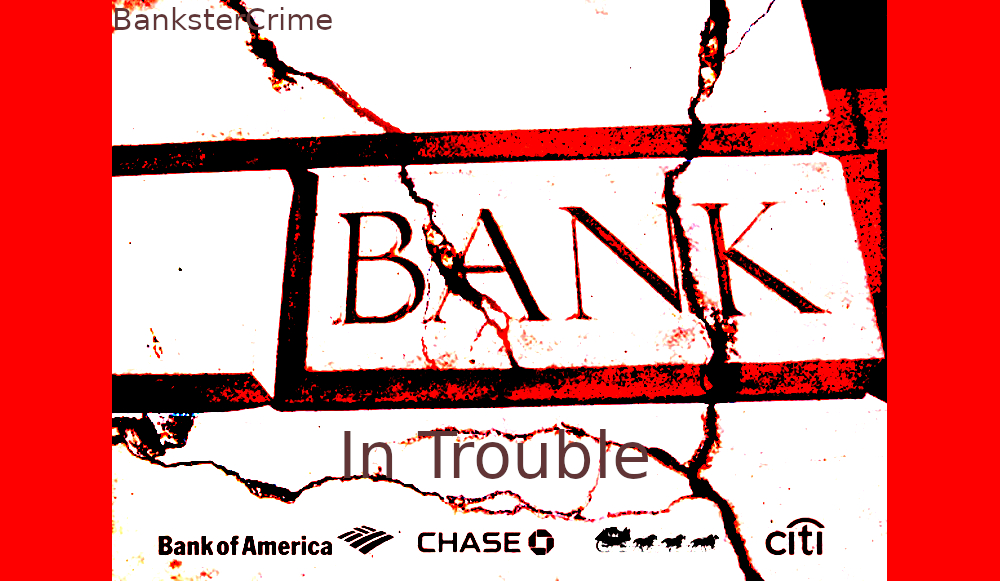
BanksterCrime:
As we approach 2024, the United States banking system faces enormous issues, with figures estimating a staggering $517 billion in unrealized losses threatening the solvency of 63 institutions. This issue has thrown the entire system’s health into sharp focus, raising fears about probable insolvency and the larger economic ramifications.
The Federal Deposit Insurance Corporation (FDIC) has placed 63 lenders on its ‘Problem Bank List,’ indicating financial, operational, or managerial problems that could lead to insolvency. These banks have a total of $82.1 billion in assets, indicating a troubling trend in the financial system. The increase in unrealized losses, mostly from residential mortgage-backed securities, indicates the effects of rising mortgage rates and continuing inflation.
The number of banks on the Problem Bank List, those with a CAMELS composite rating of “4” or “5”, rose from 52 in Q4 2023 to 63 in Q1 2024. The number of problem banks accounted for 1.4 percent of all banks, which is within the average range for non-crisis periods of one to two percent.
Despite these troubling data, the FDIC does not believe the US banking system is in imminent danger. However, it notes that persistent difficulties like as inflation, unpredictable market rates, and geopolitical concerns continue to put pressure on the industry. These characteristics may cause credit quality, earnings, and liquidity issues, demanding regular monitoring and continued supervisory attention.
The current state of affairs has also spurred debate regarding the function of cryptocurrencies, with some analysts predicting that Bitcoin’s value will grow as it regains its status as a safe-haven asset during banking crises. This viewpoint emphasizes the changing environment of financial security and the need for alternative investing options in difficult times.
Looking ahead, it’s evident that the US banking sector is operating in a complicated environment. The FDIC’s warnings serve as a reminder to remain vigilant and prepared in the face of potential financial upheaval. Understanding these developments is critical for both individuals and businesses seeking to make informed decisions and protect their financial well-being in an ever-changing economic climate.
The effects of bank insolvency are far-reaching, with important implications for the economy, the financial sector, and individuals. Insolvency occurs when a bank’s liabilities surpass its assets, leaving it unable to satisfy its financial obligations. This circumstance can trigger a chain of events that affect a variety of parties.
Failure in the banking sector can lead to a loss of confidence among customers and investors. This can lead to a bank run, in which depositors rush to withdraw their funds for fear of losing their savings. This scenario exacerbates the liquidity issue and has the potential to lead to the bank’s demise.
Bank collapse can also have a negative impact on the economy. Banks play an important role in the financial system by extending loans to businesses and individuals. When a bank fails, the availability of credit is disturbed, which can cause a drop in economic activity. Furthermore, if numerous banks are damaged, it might trigger a systemic crisis, potentially leading to a recession.
Individuals with deposits in an insolvent bank are at risk of losing their savings. Although deposit insurance systems exist to safeguard depositors, they often only cover a fraction of accounts, and retrieving protected funds can be time-consuming. Furthermore, employees at the insolvent bank may lose their jobs, and shareholders may lose their money.
The legal repercussions of a bank failure may include restructuring debt, selling assets to satisfy creditors, or even dissolving the bank. In some circumstances, the government may intervene to rescue a failing bank in order to avoid systemic risk, which can be contentious.
Overall, the banks’ inclusion on the FDIC’s trouble list is a severe issue that requires immediate and effective management to limit its negative repercussions on the financial system and the economy as a whole. It emphasizes the necessity of strong regulatory frameworks and sound risk management strategies in financial organizations.
While the specific Problem Bank List is not available, information about recent bank failures can be found on the FDIC’s website: https://www.fdic.gov/resources/resolutions/bank-failures/index.html.
Subscribe To BanksterCrime Today!
![]()

